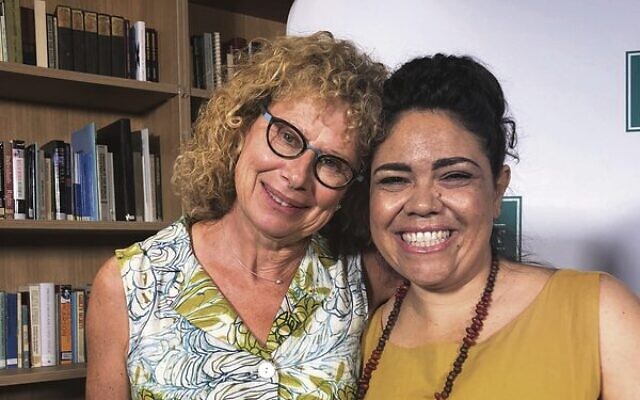Assimilation is a way station to normalisation
It is exactly what Jacinta Nampijinpa Price wants for indigenous Australians, especially in outback communities.
In a recent spray against the chief proponent of the No vote, Noel Pearson accused Senator Jacinta Nampijinpa Price of betrayal by promoting “assimilation”. Pearson believes that the Voice to Parliament enshrining Aboriginal separate status in the Constitution forevermore would serve his people better. Jewish sympathisers would have cheered Noel, recalling how ‘assimilation’ has frequently been regarded as the chief cause of Jewish demise. Academics and community leaders regularly cite rising rates of intermarriage and secularisation in the postwar, post-Holocaust period when newly-arrived Jewish refugees did not wish to parade their difference as had so often been imposed on them in Europe and the Middle East.
Arriving virtually penniless, many Jews worked long hours, sometimes through Shabbat and the chagim, to provide for their children’s future education and prosperity. Sociologist of Judaism, Samuel Heilman, labelled them “traditional” Jews since the Orthodox customs they were raised with were preferred over Reform even if sparsely observed. Yet they achieved exactly what they intended, enabling their children to pursue higher education and business opportunities, laying the foundation of a prosperous middle class. Being involved in mainstream society did not spell the end of the Jews, but empowered them to build synagogues, schools and other community organisations.
In this modern, some would say Protestant influenced, secular democracy, Jewish life was a far-cry from the impoverished shtiblech and cheder of Eastern Europe, described by Solomon Maimon in his autobiography Lebengeschicte 1792-93) where boys, often malnourished and poorly clothed, pored over texts that had little or no relevance to the modern world that was unfolding all around them. Jewish girls were married as young as 13, often forced to raise an ever-growing brood of children, whom it was largely their responsibility to feed.
In contrast, in “the new world” Jews adopted many of the practices and professions of their gentile neighbours, building up their confidence as proud citizens and as loyal Jews. Modern Jewish scholarship flourished as did the many shades of Jewish religious life among Orthodox, Conservative and Progressive expressions.
The contribution of assimilation in this trajectory of upliftment cannot be denied, but it was achieved through the voluntary and selective choices that Jews in the Diaspora made for themselves. There are many examples of how Jews assimilated features of the dominant society, but one is how denominational differences, which characterise Protestant churches, became a model for Jews, such that variations of style and theological emphasis could also be catered for and given expression in the Jewish tradition. Spiritual innovation helped to keep Jews under a broad umbrella, even if their tastes and political leanings differed.
It remains an exciting and even necessary process of religious and cultural development that most traditions face in the new world, especially in respect to the rights of women and children. It is exactly what Jacinta Nampijinpa Price wants for indigenous Australians, especially in outback communities. Her own mother, Bess Nangayarri Price, AO, a full blood Walpiri woman from Yundemu, had a child at 13 and finally escaped domestic violence at 19 to pursue training in Education.
When I interviewed Bess, a former MP for the Country Liberal Party, in her home in Alice Springs, she related how the belief in sorcery and the law of “payback” had caused the deaths of seven of her family members in that year alone. Yet the UN “rapporteurs” who came around to interview her only wanted to know examples of “white on black racism”. She told them that the scourge of Aboriginal life was not racism, which she had not experienced, but an endemic problem of pre-modern cultural practices: “My people are crying out for moral guidance. Instead, they are being told that their culture, however the Left of politics define it, is always right.”
When I retired from the ABC in December 2018, I chose as my last guest on The Spirit of Things, Bess’s daughter, Jacinta Nampijinpa Price, who described herself as a Celtic Aboriginal Australian, acknowledging her father’s Irish Australian background.
Like so many Aboriginal Australians, including Lutheran College educated Noel Pearson, intermarriage has been part of their heritage since 1788. Those who excelled were a product, not a victim, of European education and culture, including more than 50 per cent of Aborigines and Torres Straight Islanders who are Christian.
Yet Jacinta’s brave critique of traditional elders who have tolerated the sexual abuse of children and domestic violence in the outback was met with resistance and disbelief. In her mother’s words, “Aboriginal culture is not some Disneyland Dreamtime”, but is in urgent need of reform.
That desire is not a betrayal of indigenous Australians, but classifying them in the Constitution, as a separate race requiring special treatment in perpetuity, may well be. Jews should know that more than others.
Dr Rachael Kohn AO is the author of The Other Side of the Story (atfpress.com) and was the producer and presenter of The Spirit of Things on ABC Radio National from 1997-2018.


comments